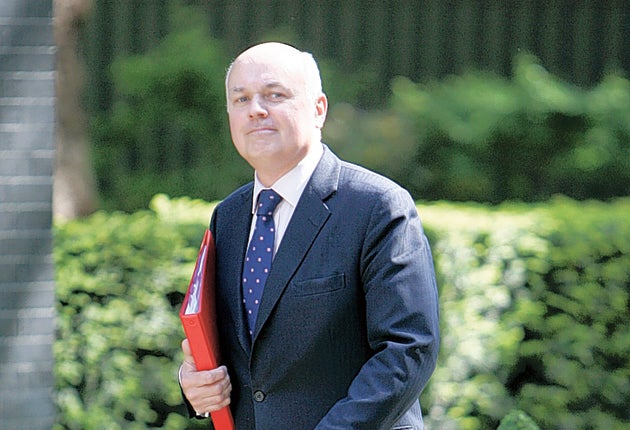We must not 'park' people on benefits, says Duncan Smith

Your support helps us to tell the story
From reproductive rights to climate change to Big Tech, The Independent is on the ground when the story is developing. Whether it's investigating the financials of Elon Musk's pro-Trump PAC or producing our latest documentary, 'The A Word', which shines a light on the American women fighting for reproductive rights, we know how important it is to parse out the facts from the messaging.
At such a critical moment in US history, we need reporters on the ground. Your donation allows us to keep sending journalists to speak to both sides of the story.
The Independent is trusted by Americans across the entire political spectrum. And unlike many other quality news outlets, we choose not to lock Americans out of our reporting and analysis with paywalls. We believe quality journalism should be available to everyone, paid for by those who can afford it.
Your support makes all the difference.The work and Pensions Secretary, Iain Duncan Smith, will pledge today to carry out sweeping welfare reforms to improve incentives to work for those on benefits, tackle poverty and improve social mobility.
In his first speech since joining the Cabinet, he will outline proposals to demolish barriers which prevent millions from moving from welfare to work. He has asked his officials to investigate whether 52 separate benefits could be merged into a single payment – a streamlining that would inevitably create many losers.
Pressure groups fear that the Government will bring in tougher sanctions against people on jobless, sick and disabled benefits who turn down offers of work.
Many previous holders of his post have promised radical welfare reform without delivering it, and it was seen as the "unfinished business" of Margaret Thatcher's revolution. However, Mr Duncan Smith has already done much of the spadework. After being ousted as Tory leader in 2003, he set up the Centre for Social Justice to seek new ways of tackling poverty.
He wants to transform his Department for Work and Pensions (DWP) from one which pays out benefits to one with a mission to reduce poverty and remove the barriers to social mobility and equal opportunity. He will promise to tackle a "culture of dependency" by addressing the root causes of poverty at every level.
The scale of his challenge will be highlighted in a "state of the nation" government report published today showing that: 1.4 million people have been on an out-of-work benefit for nine or more of the last 10 years; income inequality is now at its highest level since comparable statistics began in 1961; social mobility is worse than in the US, France, Germany, Spain, Sweden, Canada, Finland and Denmark; and a higher proportion of children grow up in workless households in the UK than in any other EU country.
Mr Duncan Smith will say: "A system that was originally designed to help support the poorest in society is now trapping them in the very condition it was supposed to alleviate. Instead of helping, a deeply unfair benefits system too often writes people off.
"The proportion of people parked on inactive benefits has almost tripled in the past 30 years to 41 per cent of the inactive working age population. That is a tragedy. We must be here to help people improve their lives – not just park them on long-term benefits."
The Work and Pensions Secretary believes that Gordon Brown was a "roadblock" to reforms favoured by his predecessor, Tony Blair, claiming that under Labour, work did not pay.
"For many people, the move from welfare into work means they face losing more than 95p for every additional £1 they earn. As a result, the poor are being taxed at an effective tax rate that far exceeds the wealthy. We have in effect taken away the reward and left people with the risk. That must and will change," he will say.
Mr Duncan Smith will argue that endemic poverty and inter-generational worklessness can only be tackled by a root-and-branch reform.
In an interview with The Spectator magazine, he warned that without sweeping change, "God help us in 10 years' time because the system itself will collapse under the weight of its own inertia and inconsistency". He said Mr Brown's flagship tax credits scheme, run by the Treasury, left the DWP to "struggle with some of the bits and pieces of the welfare system... Unless we fundamentally change the system then we are going to be playing games for the next four or five years".
He told the magazine that "it is an absolute imperative to start moving that retirement age up" and is attracted to the idea of linking the state retirement age to rising life expectancy. He also wants to "get rid of this statutory retirement age, which is a ridiculous nonsense, because people are going to have to work longer".
Imran Hussain, head of policy, rights and advocacy at the Child Poverty Action Group, said: "A modern welfare system must guarantee family security, help end child poverty and move people into work that leaves them better off instead of adding to the numbers facing in-work poverty. The Government has a chance to turn away from recent failures and start working with people's ambitions and motivation.
"We need a genuine safety net with a bounce in it, instead of trapping people in bureaucracy, sanctions and barriers to taking control of their lives."
Join our commenting forum
Join thought-provoking conversations, follow other Independent readers and see their replies
Comments